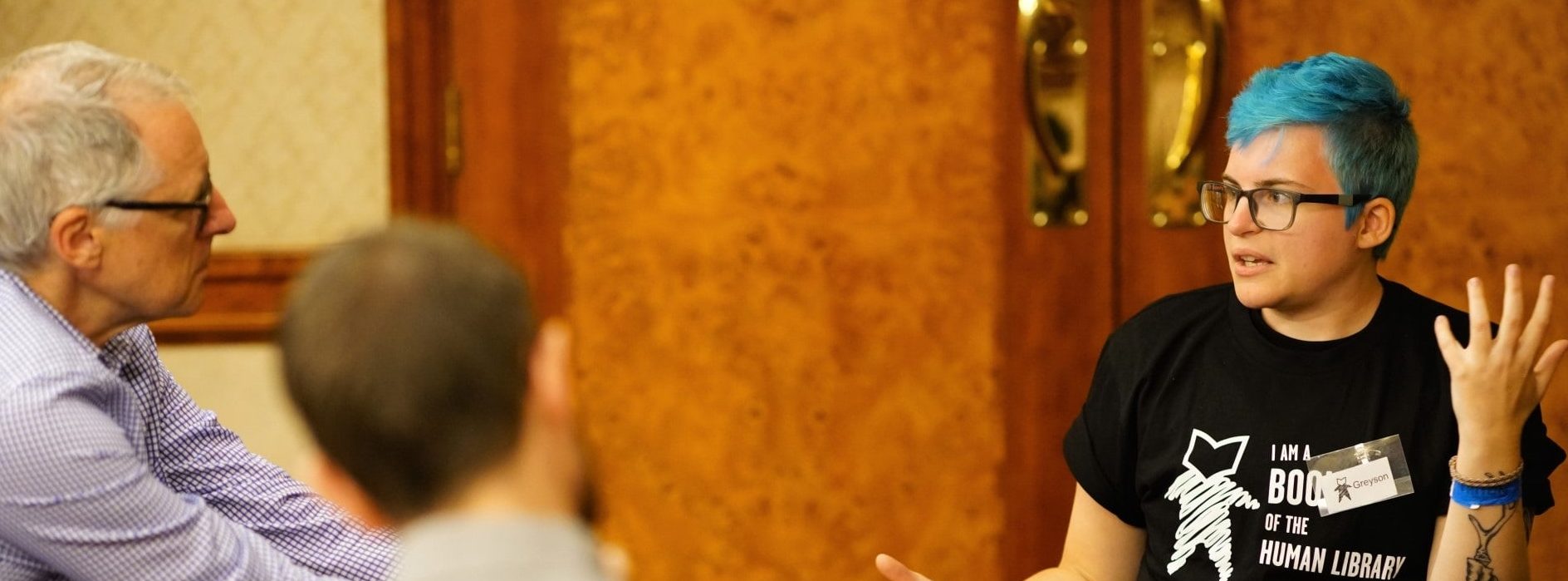In Copenhagen, the capital of Denmark, there is an original library that is gaining momentum around the world and is called the “human library.” Here people do not come to borrow books but to ask human beings to share the story of their lives.
Anyone can come in and choose a person whose worldview or lifestyle is intriguing—such as a refugee or AIDS patient, a Tibetan monk or a PTSD suffering soldier, transgender, or drug addict—and simply have a conversation with them for thirty minutes.
In a well-kept green garden in the heart of the city, the interviewees will tell the story of their lives openly and calmly, and the “reader” can freely ask questions, and engage in dialogue. The premise is to meet live people commonly persecuted and to confront them without prejudice or taboos.
Hypothetically if we could listen to all the stories of all the people in the world, whatever and whoever they are, we would discover a common thing: they are all stories of disruption and are a result of their environment’s impact on them, the education they received as children, and the society that shaped them over the years.
“There is no prevention or prohibition of cordial human conversation, nor is there room to undo the identity of each and every one, but the most important thing is to find and highlight in these personal stories the same hidden point that arises in the search for the whole story, a story of reconnection, a story of humanity’s friendly and supportive relations. This book is for any and everyone to open.”
In a divided and polarized world, it sounds as if a tolerance-building human library initiative could help people, both the narrator and the listener, but it can only confuse them both. The narrator speaks from his or her gaze, imprisoned in their own narrative, because no private life story really leads to reading our great and shared story, the one that ends in a happy humanity.
Our common story begins with the plan of creation, a pre-existing and constantly running plan that directs everything in the entire system of nature and humanity. —Starting from the big bang, from the spread of an infinite number of particles in the inanimate, vegetative, animate, and human degrees, creation continues to connect all its parts, to collect and group all its details, and to bring unity between all creatures and the feeling of the wonderful harmonious power of creation. That’s the whole story.
The plot is complicated by the increasing egoistic nature in every person, another factor that stems from creation’s natural evolution, which strengthens our sense of individuality, separates us from others, and makes us feel superior to the rest. Therefore, the shared story is overlooked.
As a result, speakers in the human library brand their life story as a “bestseller” and it proudly inflates and reflects their life experience as if they were real acts of heroism. Instead of seeing how our inborn human egotistical nature, the evil instinct operating in everyone from an early age for the destruction of the other, has led us as a human society to abuse others.
The narrator will naturally soften the problem, color it in a certain hue, give others advice that they are unlikely to follow, and the personal example may confuse the listener. Instead of being impressed by the pervasive egoism that rules society and prevents us from reaching the purpose of creation and recognizing that we have deviated from the purpose of life, we only praise the lifestyles we have created and perpetuate them in beautiful words and define them as the essence of life.
There is no prevention or prohibition of cordial human conversation, nor is there room to undo the identity of each and every one, but the most important thing is to find and highlight in these personal stories the same hidden point that arises in the search for the whole story, a story of reconnection, a story of humanity’s friendly and supportive relations. This book is for any and everyone to open.











